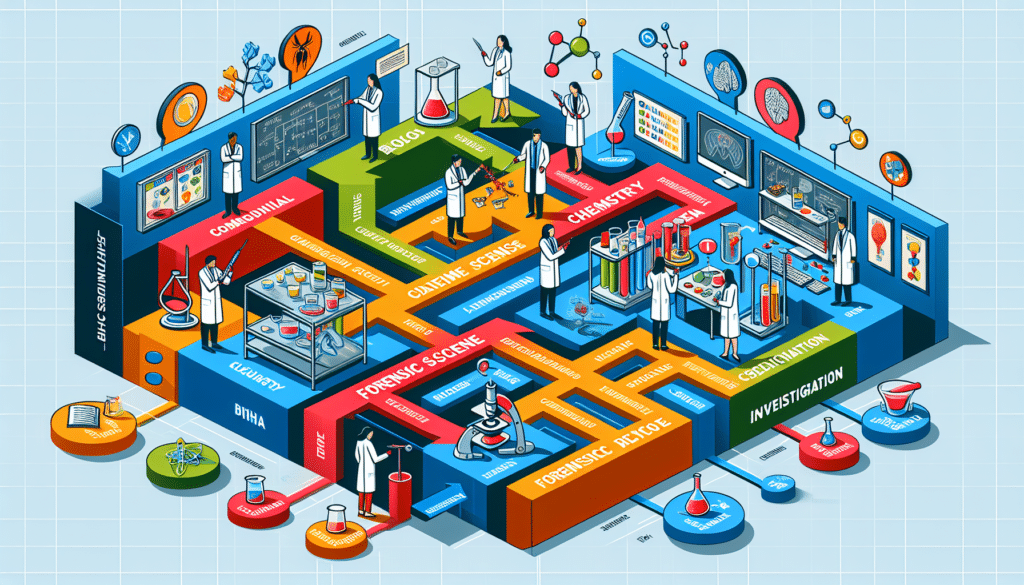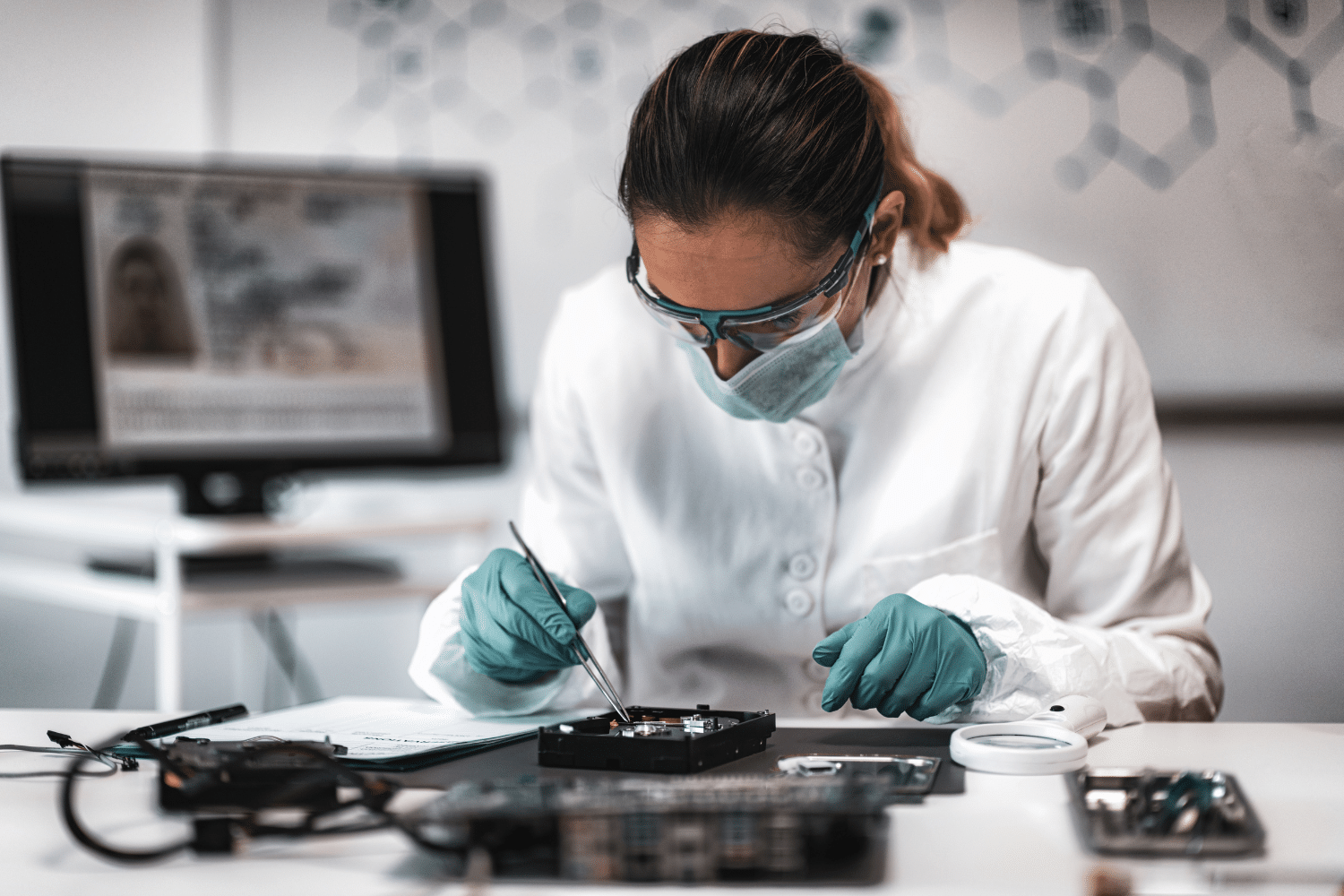Are you thinking about pursuing a forensic science degree? This article will help you understand what a forensic science degree involves, compare different types of degrees, and explore the career paths available to graduates.
Key Takeaways
- Forensic science degree programs are available as Bachelor of Arts (BA) or Bachelor of Science (BS), with each path aligning differently to career goals in criminal justice and technical applications.
- Accreditation from bodies like FEPAC is essential for forensic science programs, enhancing their reputation and improving job prospects for graduates in a competitive job market.
- Practical experience through internships and hands-on training is crucial for forensic science students, ensuring they are well-prepared for various roles within the field.
Understanding Forensic Science Degrees

Forensic science degree programs focus on applying scientific methods to law-related matters, making them integral to the criminal justice system. Whether you’re interested in a Bachelor of Arts (BA) or a Bachelor of Science (BS) in forensic science, the choice will significantly impact your career trajectory. The BA typically emphasizes liberal arts and social sciences, including courses in sociology and psychology, while the BS focuses on scientific and technical aspects, covering statistics and research methods.
Students pursuing a BS in forensic science are often better prepared for careers requiring technical skills and quantitative analysis, such as crime scene investigation and laboratory work. This degree is ideal for those who enjoy the scientific rigor and hands-on nature of forensic sciences.
On the other hand, a BA might be suitable for those interested in roles that integrate criminal justice with social sciences, potentially leading to careers in forensic psychology or criminal justice administration.
Ultimately, the choice between a BA and a BS should align with your career goals in the field of forensic science. Students should consider their interests and strengths when choosing their degree path to support their aspirations, whether in crime laboratories, crime scene investigation, or other forensic science roles.
Accreditation in Forensic Science Programs
Accreditation plays a vital role when selecting a forensic science program. The Forensic Science Education Programs Accreditation Commission (FEPAC) ensures that forensic science programs meet rigorous standards in curriculum, faculty qualifications, and facilities. Programs with FEPAC accreditation undergo regular evaluations to maintain high standards, ensuring the education provided is current and comprehensive.
A degree from an accredited forensic science program is highly regarded within the forensic community, especially as competition in the job market increases. FEPAC or regional/national accreditation enhances a program’s reputation, making it more appealing to prospective students and employers alike.
For example, Lasell’s Forensic Science major, which holds FEPAC accreditation, showcases a commitment to quality education that can significantly boost your career prospects in forensic science.
Core Components of a Forensic Science Degree Program

A forensic science degree program is a blend of foundational sciences, specialized forensic courses, and hands-on training. These components are designed to prepare students for the diverse challenges they will face in their forensic science careers.
From the basics of biology and chemistry to the intricacies of crime scene investigation, the curriculum covers a wide range of subjects essential for a successful career in forensic biology and forensic science.
Foundational Sciences
Foundational sciences form the backbone of any forensic science program. Courses in biology, chemistry, mathematics, and physics are integral to the Bachelor of Science in Forensic Science curriculum. These subjects provide the scientific principles necessary for analyzing evidence and understanding the complex processes involved in forensic investigations. Students develop critical laboratory skills and analytical abilities that are essential for their future roles.
Mastering these foundational sciences helps build the critical thinking and problem-solving skills needed to excel in forensic science. Skills like handling biological samples and conducting chemical analyses are particularly emphasized, ensuring students are well-prepared for the practical aspects of their careers.
Specialized Forensic Courses
Specialized forensic courses are where students dive deeper into the specific areas of forensic science. Advanced courses might include forensic botany, molecular genetics, and forensic entomology, providing in-depth knowledge and technical skills. These courses are designed to equip students with the expertise needed for various forensic science roles, from analyzing DNA to examining plant evidence at crime scenes.
Forensic scientists utilize these advanced methods to analyze evidence and contribute significantly to criminal investigations. Specialized courses help students gain knowledge and develop the ability to apply it in real-world scenarios, enhancing their readiness for professional practice.
Hands-On Training
Hands-on training is a critical component of forensic science education, as it equips students with practical skills essential for their future careers. Students gain extensive practical experience through simulated crime scene labs and unique learning experiences in dedicated crime scene laboratories. These practical sessions allow students to apply their theoretical knowledge in real-life scenarios, preparing them for the challenges they will face in the field.
On-campus forensic programs often provide access to specialized facilities and equipment for hands-on training. This includes crime scene houses where students can engage in realistic simulations, enhancing their practical skills and confidence.
Combining practical experience with academic learning prepares students for successful careers in forensic science.
Career Paths with a Forensic Science Degree

A forensic science degree opens up a wide array of career opportunities. From crime scene investigators and forensic scientists to roles in related fields like forensic psychology and veterinary medicine, the possibilities are vast.
These programs prepare students for careers in crime scene investigation and laboratory work, equipping them with the necessary skills.
Crime Scene Investigator
Crime scene investigators (CSI) play a pivotal role in gathering evidence and documenting crime scenes meticulously to aid in criminal trials. To be effective in this role, CSIs must possess strong analytical skills, attention to detail, and the ability to communicate findings clearly. They often work closely with law enforcement and forensic scientists to solve crimes, making their work both challenging and rewarding.
As of 2021, the median pay for forensic science technicians, which includes crime scene investigators, was reported to be around $60,590 annually. This role requires a strong educational background in forensic science, coupled with practical experience in crime scene investigation, to ensure accurate and thorough evidence collection and analysis.
Forensic Scientist
Forensic scientists primarily work in crime labs at local, state, and federal levels, analyzing physical evidence from crime scenes. Their work involves DNA analysis, toxicology reports, and various other scientific techniques, including forensic chemistry, to support criminal investigations and legal proceedings. A solid educational foundation in chemistry, along with a forensic science certificate, is beneficial for a career as a forensic scientist.
Attending schools with strong industry connections can significantly enhance job prospects for aspiring forensic scientists. These connections often lead to internship opportunities and job placements in reputable crime laboratories, providing a pathway to a successful career in forensic science.
Related Fields
Graduates with a forensic science degree can also pursue careers in related fields such as forensic psychology, veterinary medicine, and various health professions. These roles often require additional specialized education but allow forensic science graduates to leverage their skills and knowledge in diverse ways.
Forensic science majors may also explore careers in criminal psychology, legal studies, and public health. These fields offer opportunities to apply forensic expertise in broader contexts, contributing to the criminal justice system and public safety in different capacities.
Online vs. On-Campus Forensic Science Programs

Choosing between online and on-campus forensic science programs depends on individual preferences and circumstances. Both formats offer unique advantages that cater to different needs and learning styles.
Benefits of Online Programs
Online forensic programs offer flexibility to learn from anywhere, making them ideal for students with work or personal commitments. These programs provide high-quality education and enable remote internships and collaborations with law enforcement agencies. It helps in enhancing practical skills and career prospects.
Accredited online forensic programs meet rigorous educational standards, offering a comprehensive and flexible learning experience. Virtual labs and simulations in the curriculum give students practical experience in a digital environment.
Advantages of On-Campus Programs
On-campus forensic programs provide a structured, hands-on education with classroom instruction and practical training in labs and mock crime scenes. These programs give access to specialized facilities and equipment, crucial for gaining hands-on experience.
Faculty and professionals guide students, offering mentorship and networking opportunities. Strong alumni connections and ties to professional organizations enhance career development and job placement.
Gaining Practical Experience
Practical experience is essential for forensic science students, bridging the gap between theoretical knowledge and real-world application. Accredited forensic science programs often provide more internship opportunities, facilitating professional growth and hands-on learning.
Internships and Work Experience
Internships offer crucial real-world experience for forensic science students. Many programs facilitate internships at crime labs, law enforcement agencies, and forensic science departments, allowing students to gain practical skills and industry knowledge.
Internships often require students to work a minimum number of hours per week over several months, providing substantial hands-on experience. Additionally, students can receive college credit for completing certain unpaid internships, further enhancing their educational experience.
Research Projects
Engaging in research projects is another valuable way for forensic science students to gain practical experience. Research opportunities may be available from the first year of study, allowing early engagement in faculty-led projects. These projects help students develop critical analytical skills and a deeper understanding of scientific principles as they apply to forensic science.
Forensic science majors can also undertake independent research projects that align with their interests. Research projects enhance students’ knowledge and skills and prepare them for advanced study or specialized roles within forensic science.
Preparing for a Career in Forensic Science

A career in forensic science requires a broad range of skills and knowledge. Forensic science courses typically include natural sciences, statistics, and communication skills, essential for evaluating evidence and communicating findings effectively.
Advanced courses like forensic botany, toxicology, and forensic toxicology further prepare students for specialized roles.
Essential Skills
Analytical skills are crucial for success in forensic science, enabling professionals to analyze complex evidence effectively. Strong observational skills are necessary to accurately collect and analyze evidence. Attention to detail ensures precise results during evidence analysis.
Besides technical skills, strong critical thinking and effective communication are essential for forensic scientists. This skill combination enables professionals to perform well in forensic science roles and present their findings convincingly in court.
Job Market Outlook
The job market for forensic science technicians will grow significantly, with a 14% increase in employment projected by 2028. The Bureau of Labor Statistics expects about 2,600 annual job openings over the next decade, indicating strong demand.
The rising use of forensic evidence in criminal investigations drives this growth. Advancing forensic techniques will keep the demand for skilled technicians high, offering ample career opportunities for graduates.
Choosing the Right Forensic Science Program
For aspiring professionals, it is crucial to choose the right forensic science program. This decision plays a significant role in their future careers. FEPAC accreditation enhances a program’s reputation, making it more appealing to students and employers. When selecting a program, consider the availability of specialized concentrations that align with your career goals.
Forensic science graduates can pursue careers in criminal justice, scientific laboratories, and other science-related fields, or consider graduate studies in forensic science, chemistry, or biology. Choosing a program with a curriculum that matches your interests and career aspirations is key to achieving your professional objectives.
Summary
In summary, a forensic science degree lays the foundation for exciting careers in crime scene investigation, forensic science, and related fields. Choosing the right program, whether online or on-campus, and gaining practical experience through internships and research are crucial steps.
As you start this journey, focus on accreditation, core program components, and essential skills. With the right education and experience, you can significantly impact forensic science, contributing to justice and public safety.
Frequently Asked Questions
You can choose between a Bachelor of Arts (BA) or a Bachelor of Science (BS) in forensic science, depending on your career interests and the focus of your studies. Each degree offers unique curricular paths to prepare you for different roles in the field.
Accreditation is crucial for forensic science programs. It ensures high standards in curriculum and faculty qualifications, boosting the program’s credibility and graduates’ career opportunities.
A forensic science degree program includes foundational sciences like biology and chemistry, specialized forensic courses. It provides practical experience through labs and internships. These elements prepare you for a career in forensic science.
With a forensic science degree, you can pursue careers as a crime scene investigator or forensic scientist. You can also explore opportunities in forensic psychology and veterinary science. These diverse paths allow you to apply your skills in various investigative and scientific contexts.
Choose a forensic science program by evaluating its accreditation, such as FEPAC, specialized concentrations. It aids in your career objectives to ensure it enhances your job prospects. Prioritizing these factors will guide you in making the right decision for your future.







